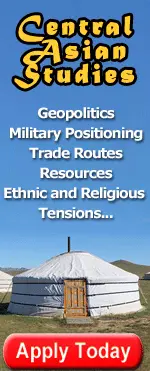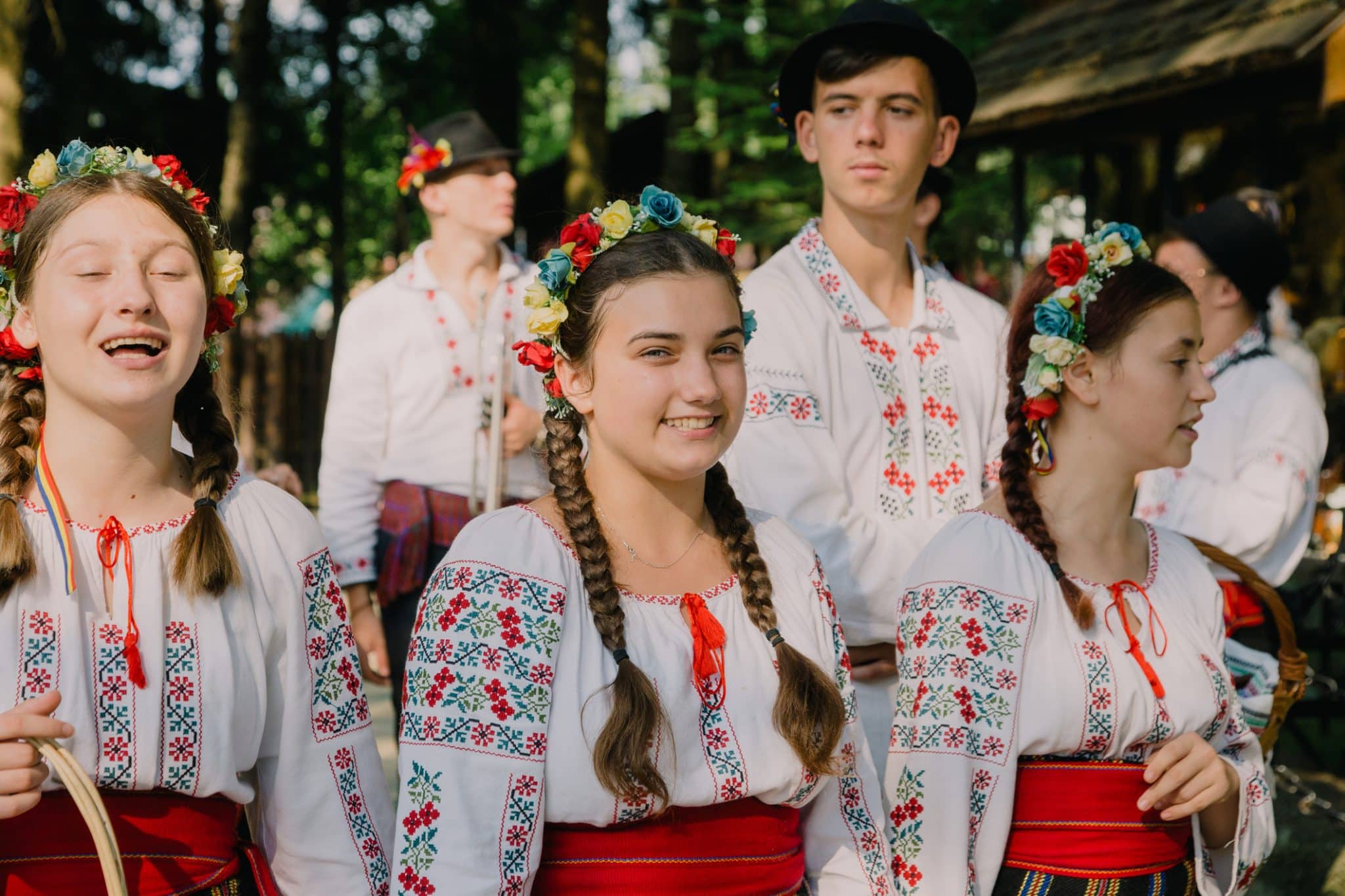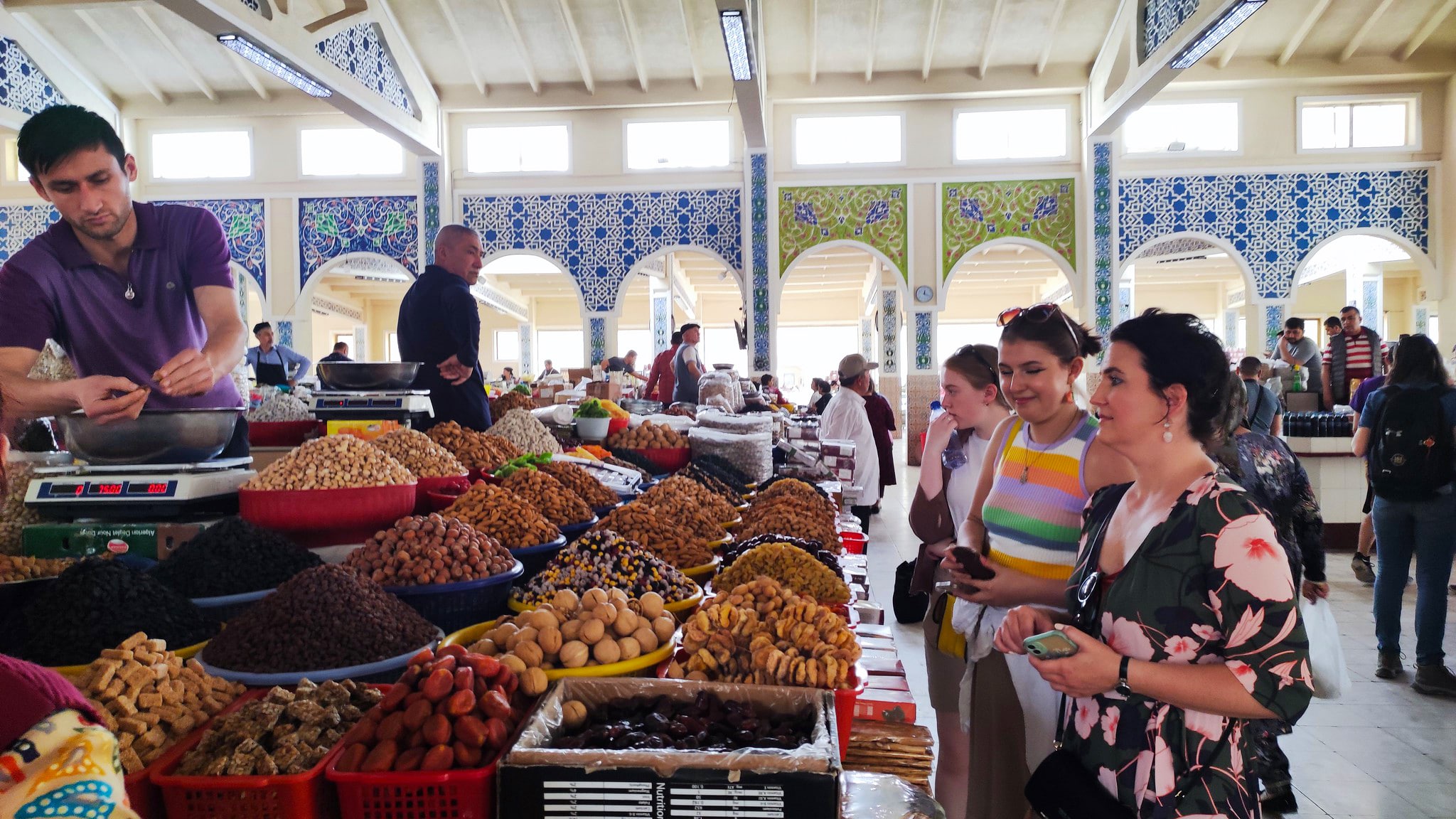 The Talking Phrasebook Series presents useful phrases and words in side-by-side translation and with audio files specifically geared to help students work on listening skills and pronunciation. Below, you will find several useful phrases and words. To the left is the English and to the far right is the Uzbek translation. Uzbek is currently transitioning from the Cyrillic script to Latin. While Cyrillic is common in Uzbekistan, Latin is the official script.
The Talking Phrasebook Series presents useful phrases and words in side-by-side translation and with audio files specifically geared to help students work on listening skills and pronunciation. Below, you will find several useful phrases and words. To the left is the English and to the far right is the Uzbek translation. Uzbek is currently transitioning from the Cyrillic script to Latin. While Cyrillic is common in Uzbekistan, Latin is the official script.
In the center column for each row is a play button. The recorded file will feature first English, then the Uzbek in three versions: one slow, one with each syllable broken out, and a last version that will be spoken as it might be overheard in a conversation between native speakers. (Except in “Counting,” whose audio files have been grouped into three sets.)
Interested in learning more about Uzbek culture? Access our full Uzbek archives here.
Interesting Facts about Uzbek
- There is no grammatical gender in Uzbek. The adjective “u” can fill in for “he,” “she,” and “it.”
- Uzbek has six noun cases: nominative, accusative, genitive, dative, locative, and ablative. Ablative is most common in Turkic and Turkic-influenced languages and most commonly denotes movement away from something else.
- Uzbek, like many Turkic languages, use subject-object-verb order. If English used this same rule, you would need to say, for example, “I Uzbek learn.”
- Uzbek can use complex suffix strings for example, the word “keldimizmi” is effectively a full sentence meaning “Have we arrived.” “Kel” is the root while “di” indicates past tense, “miz” applies it to “we,” and “mi” indicates that a question is being communicated.
- Uzbek uses postpostions rather than prepositions. If English used these, you would need to say, for example, “I live America in.”
- Because the Persian Empire once ruled much of Central Asia, Uzbek has strong Persian influences. However, it still shares a relatively high degree of mutual intelligibility with many other Turkic languages such as Turkmen and Kazakh.
- Uzbekistan is by far Central Asia’s most populous country, with about 35 million people and growing. There are also large populations of ethnic Uzbeks outside of Uzbekistan. The vast majority of these people are native Uzbek speakers. Altogether, there are about 44 million people who speak Uzbek as a first language worldwide.
- In part because Uzbekistan was once part of larger empires spreading to the south, including the Iran-based Persian, the India-centered Mughal, and the home-grown Timurid Empires, there are still about 4.5 million Uzbek speakers in northern Afghanistan, where it is an official language, about 300,000 in Pakistan, and about one million in western Kyrgyzstan, concentrated around the city of Osh.
- Uzbekistan was once part of the Russian empire and the USSR and retains strong commercial and diplomatic ties with Russia. Most Uzbeks can speak Russian and Russian is a mandatory subject in public schools. As of 2021, there were about 5 million ethnic Uzbeks working as guest laborers in Russia.
Unique Characters and Sounds in Uzbek
Modern Uzbek uses a Latin alphabet that very closely resembles English, including in its use of diagraphs such as ch and sh, which make the same sounds as in English. However, several unique letters and modified characters (especially those involving apostrophes) represent sounds not found—or pronounced differently from English.
One of the most unique sounds in Uzbek is g’. It’s also relatively rare in the language. It is pronounced similar to how the French pronounce the “r” in “Paris.” Think of pronouncing “g,” but do not let the tongue touch the top of the mouth. The result should be something like nasal, raspy “r.”
The table below explains more of Uzbek’s unique sounds briefly.
| Uzbek Letter | English Closest Equivalent | Description |
|---|---|---|
| Oʻ g’ | “aw” in law (but deeper in the throat) | Pharyngealized “o” |
| Gʻ g’ | Arabic “gh” / French “r” | Voiced uvular fricative |
| Q q | Like “k” by sharper and harder | Voiceless uvular stop |
| X x | like the “x” in Russian or Yiddish also like the “ch” in loch or Bach |
Voiceless velar fricative |
| Ng | “ng” in sing | Nasal velar |
Survival Basics for Uzbek
| Hello! | Assalomu Aleykum! | |
| Yes | Ha | |
| No | Yo’q | |
| Good morning! | Hayirli tong! | |
| Good evening! | Hayirli kech! | |
| What’s up? | Salom! | |
| How are you? | Yaxshimisiz? | |
| Good, thanks, and you? | Yaxshi, rahmat, o’zingizchi? | |
| Good bye! | Hayr! | |
| See you later! | Ko’rishguncha! | |
| Sorry! | Kechirasiz! | |
| Do you speak English? | Siz Inglizcha gaplashasizmi? | |
| I don’t speak English. | Men Inglizcha gapirmayman. | |
| I only speak a little Uzbek. | Men faqat ozgina Ozbekcha gapiraman. | |
| I understand. | Tushunyapman. | |
| I don’t understand. | Men tushunmayapman. | |
| Thank you! | Rahmat! | |
| Thank you very much! | Katta rahmat! | |
| Very well, thanks! | Juda yaxshi, rahmat! | |
| Good | Yaxshi | |
| Please | Iltimos | |
| Please | Uzr! | |
| You’re welcome! | Arzimaydi! | |
| Excuse me! | Kechirasiz! | |
| A little | Biroz | |
| Could you speak more slowly? | Sekinroq gapiring iltomos. | |
| Could you write that down? | Yozing, iltomos. | |
| I need a doctor! | Menga shifokor kerak! | |
| Call the police! | Mirshabni chaqiring! |
Introductions in Uzbek
| What is your name? | Ismingiz nima? | |
| Pleased to meet you | Tanishganimdan xursandman. | |
| I am __ years old. I am 20 years old. |
Men __ yoshdaman. Men yigirma yoshdaman. |
|
| How old are you? | Yoshing gez nechada? | |
| Where are you from? | Siz qayerdansiz? | |
| I am American. | Men Amerikalikman. | |
| No, I am from Canada. | Yo’q, men Kanadadanman. | |
| She is Australian. | U Avstraliyalik.* | |
| He is Irish. | U Irlandiyalik.* | |
| We are from New Zealand. | Biz Yangi Zelandiyalikmiz. | |
| They are from Wales. | Ular Uelsdan. | |
| How do you like Uzbekistan? | O’zbekiston sizga yoqdimi? | |
| I like Uzbekistan very much. | Menga O’zbekiston juda yoqadi. | |
| Have you ever been to Samarkand? | Samarqanda hech bo’lganmisez? | |
| I have never been to Samarkand before. | Men oldin Samaraqanda hech bo’lmaganman. | |
| This is my second time in Uzbekistan. | Bu safar mening O’zbekistonda ikkinchi marta bo’lishim. | |
| What do you do? | Kim bo’lib ishlaysiz? | |
| I am on vacation. | Men ta’tildaman. |
*Note that the same form is used for both sexes.
Asking Directions
| Where are the toilets? | Hojatxona qayerda? | |
| Men | Erkaklar | |
| Women | Ayyolar | |
| Where is the nearest bank? | Eng yaqin bank qayerda? | |
| Where is the nearest post office? | Eng yaqin pochta qayerda? | |
| Where is the nearest train station? | Eng yaqin vokzal qayerda? | |
| Where is the nearest Internet café? | Eng yaqin Internet kafe qayerda? | |
| Where can I get a taxi? | Qayerdan taksi ushlasam bo’ladi? | |
| Straight ahead! | To’g’ri! | |
| Take a right! | O’ngga! | |
| Take a left! | Chapga! | |
| After the stoplight | Svetofordan keyin | |
| Next | Keyingi | |
| First | Birinchi | |
| Last | Oxirgi |
Shopping
| How much does that cost? | Necha pul turadi? | |
| The menu, please! | Menyuni bering, iltimos! | |
| I’d like a beer, please | Menga pivo, iltimos. | |
| I would like to pay. | To’lashni xohlayman. | |
| Do you accept credit cards? | Kredit kartochkalarini tolash mumkinmi? |
Counting
| 0 | Nol | |
| 1 | Bir | |
| 2 | Ikki | |
| 3 | Uch | |
| 4 | To’rt | |
| 5 | Besh | |
| 6 | Olti | |
| 7 | Yetti | |
| 8 | Sakkiz | |
| 9 | To’qqiz | |
| 10 |
(count 1-10) |
O’n |
| 11 | O’n bir | |
| 12 | O’n ikki | |
| 13 | O’n uch | |
| 14 | O’n to’rt | |
| 15 | O’n besh | |
| 16 | O’n olti | |
| 17 | O’n yetti | |
| 18 | O’n sakkiz | |
| 19 | O’n to’qqiz | |
| 20 |
(count 11-19) |
Yigirma |
| 21 | Yigirma bir | |
| 22 | Yigirma ikki | |
| 30 | O’ttiz | |
| 40 | Qirq | |
| 50 | Ellik | |
| 60 | Oltmish | |
| 70 | Yetmish | |
| 80 | Sakson | |
| 90 | To’qson | |
| 100 | Yuz | |
| 101 | Bir yuz bir | |
| 125 | Bir yuz yigirma besh | |
| 200 |
(count 21-200) |
Ikki yuz |
More About the Uzbek

World Nomad Games
The World Nomad Games is a unique international sporting event that celebrates the traditional sports and cultural heritage of the traditionally nomadic Turkic people. The World Nomad Games brings together athletes and spectators from around the world to participate in nomadic traditions through a festival of traditional sports, cultural events, and art exhibitions. The next […]

Dictionary of Uzbek Food
Uzbek cuisine is steeped in the rich history and diverse influences of Central Asia. Uzbek food is a distinctive branch of the broader Turkic culinary family, enriched by Persian influence as well as by the hearty foods of Eurasia’s nomadic cultures. Slavic influence comes from Uzbekistan’s time as a part of the Russian and Soviet […]

Uzbekistan’s Story of Identity: Heroes, Memory, and Meaning
What shapes Uzbek national identity? The answer is complex and personal, but one key element is the Uzbek national narrative. This includes the heroes and pivotal events taught in schools, the places central to the nation’s collective memory, and the language and beliefs that frame its worldview. A national narrative goes beyond history: it is […]
More Phrasebooks

The Talking Romanian (in Moldova) Phrasebook
The Talking Phrasebook Series presents useful phrases and words in side-by-side translation and with audio files specifically geared to help students work on listening skills and pronunciation. Below, you will find several useful phrases and words. To the left is the English and to the far right is the Romanian translation. In the center column […]

The Talking Turkish Phrasebook
The Talking Phrasebook Series presents useful phrases and words in side-by-side translation and with audio files specifically geared to help students work on listening skills and pronunciation. Below, you will find several useful phrases and words. To the left is the English and to the far right is the Turkish translation. In the center column for […]

The Talking Estonian Phrasebook
The Talking Phrasebook Series presents useful phrases and words in side-by-side translation and with audio files specifically geared to help students work on listening skills and pronunciation. Below, you will find several useful phrases and words. To the left is the English and to the far right is the Estonian translation. In the center column […]





